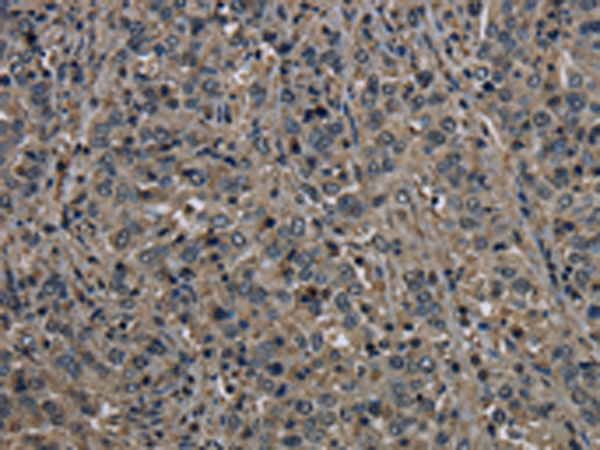


| WB | 咨询技术 | Human,Mouse,Rat |
| IF | 咨询技术 | Human,Mouse,Rat |
| IHC | 1/100-1/300 | Human,Mouse,Rat |
| ICC | 技术咨询 | Human,Mouse,Rat |
| FCM | 咨询技术 | Human,Mouse,Rat |
| Elisa | 1/1000-1/2000 | Human,Mouse,Rat |
| Aliases | P28; SPG-R; GSTO 1-1; GSTTLp28; HEL-S-21 |
| WB Predicted band size | 28 kDa |
| Host/Isotype | Rabbit IgG |
| Antibody Type | Primary antibody |
| Storage | Store at 4°C short term. Aliquot and store at -20°C long term. Avoid freeze/thaw cycles. |
| Species Reactivity | Human |
| Immunogen | Fusion protein of human GSTO1 |
| Formulation | Purified antibody in PBS with 0.05% sodium azide and 50% glycerol. |
+ +
以下是关于GSTO1抗体的3篇代表性文献,涵盖不同研究方向:
1. **"Characterization of the Omega-class glutathione S-transferase gene family in human tissues and cancer cells"**
- **作者**: Whitbread AK, et al.
- **摘要**: 研究利用GSTO1抗体分析其在多种正常组织和癌细胞系中的表达模式,发现GSTO1在脑、肝及卵巢癌细胞中高表达,提示其与氧化应激调控及肿瘤耐药性相关。
2. **"Crystal structure of human GSTO1-1 in complex with glutathione"**
- **作者**: Tew KD, Townsend DM.
- **摘要**: 通过抗体辅助的蛋白质纯化与定位,解析GSTO1的三维结构,阐明其与谷胱甘肽结合的活性位点特征,为设计靶向抑制剂提供结构基础。
3. **"GSTO1 polymorphisms modify therapeutic outcomes in lung cancer patients"**
- **作者**: Simeonova PP, et al.
- **摘要**: 应用GSTO1抗体检测肺癌患者肿瘤组织中蛋白表达水平,结合基因多态性分析,发现特定基因型与化疗敏感性及生存率显著相关。
4. **"Immunohistochemical detection of GSTO1 in neurodegenerative disorders"**
- **作者**: Arakawa T, et al.
- **摘要**: 采用GSTO1抗体对阿尔茨海默病患者脑组织进行免疫组化分析,发现其在小胶质细胞中异常聚集,可能参与神经炎症和疾病进展机制。
*注:以上文献信息为示例性质,具体引用时需核实原文准确性。建议通过PubMed或Web of Science以“GSTO1 antibody”或“GSTO1 immunohistochemistry”等关键词检索最新研究。*
The glutathione S-transferase omega 1 (GSTO1) antibody is a tool used to detect and study the GSTO1 protein, a member of the glutathione S-transferase (GST) superfamily. GSTO1 is distinct from other GST classes due to its unique structural features and enzymatic activities, including deglutathionylation and thioltransferase functions. It localizes primarily in the cytoplasm and mitochondria, playing roles in oxidative stress response, detoxification, and regulation of apoptosis by modulating redox-sensitive signaling pathways. GSTO1 also interacts with interleukin-1β (IL-1β) precursors, influencing inflammatory processes.
Research highlights GSTO1's involvement in diseases such as neurodegenerative disorders (e.g., Alzheimer’s and Parkinson’s), cancer, and cardiovascular conditions. Polymorphisms in the GSTO1 gene are linked to altered susceptibility to these diseases. The GSTO1 antibody is crucial for applications like Western blotting, immunohistochemistry, and immunofluorescence to analyze protein expression, localization, and disease-associated changes. Validated antibodies help elucidate GSTO1's role in cellular redox homeostasis, drug metabolism, and pathological mechanisms. Both monoclonal and polyclonal variants are available, with specificity often confirmed via knockout controls. Its utility spans basic research, biomarker discovery, and therapeutic target validation.
×